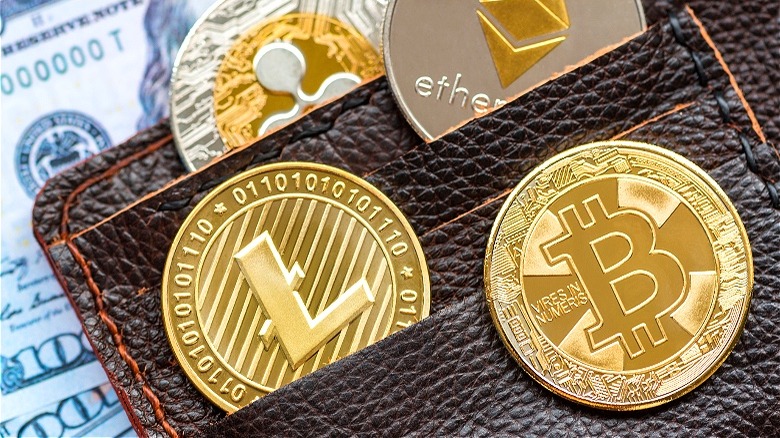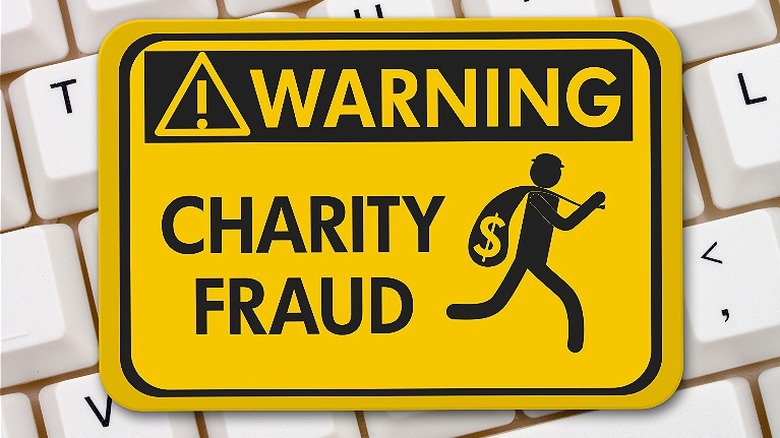10 Of The Worst Instagram Scams To Beware In 2024
A Federal Trade Cocmission study conducted between 2021 and 2023 found that scams perpetrated on social media, like Instagram, accounted for $2.7 billion in losses. As for Instagram, it's very likely a good number of those fraud cases involved the social media app, as Instagram has over 1.4 billion active users worldwide as of 2024 (per Statista).
According to a 2023 Pew Research Center survey, 47% of U.S. adults say they use Instagram, while 78% of users aged 18 to 30 years old say they do (this was 63% more than those aged 65 and older). To return to the FTC report, 38% of fraud cases for people aged 18 to 29 years old were said to have originated via social media. This number rose to 47% for fraud victims aged 18 to 19 years old.
As for the types of scams most common to social media platforms like Instagram, we've gathered information on 11 of them, from cryptocurrency scams to employment scams to subscription scams. Here's what you should be on the lookout for, so that you don't become one of the approximately 25% of Americans who have reported losing money to fraud schemes started on social media.
1. Cryptocurrency scams
Whether you believe cryptocurrency is the future or not, some of the biggest crypto scams to watch out for this year are as likely to happen on Instagram as anywhere else. According to the FBI's 2023 Internet Crime Report, cryptocurrency ranked second in terms of investment fraud, accounting for $3.9 billion worth of losses in 2023, a 53% increase from 2022.
Crypto provides hustlers ideal conditions for fraud since there's nothing in the way of a centralized bank or regulatory body policing suspicious activity, nor is there a way to reverse transactions. While regulators have shut down and even arrested privacy-oriented cryptocurrency operators due to fraud, publicly traded cryptocurrencies like monero and zcash, both of which employ features that hide transactions — including amounts and identities — continue to thrive.
The Federal Trade Commission reports that 49% of crypto-related scams between 2021 and 2022 originated on social media through direct messaging, advertisements, and posts. Almost a third were reported as happening on Instagram. Watch out for "influencers" or ads requesting payment for a service or product using cryptocurrency. It's likely a scam. (Check out influencers who promoted shady crypto scams.)
2. Employment scams
While online platforms and apps for people seeking employment aren't out of the ordinary in 2024, you may want to reconsider any employment opportunities presented to you on Instagram. Per the Bureau of Labor Statistics July 2024 jobs report, 1.8 million people in the U.S. experienced layoffs and discharges, while another 3.3 million quit. That makes for a nice pool of potential victims for employment scammers.
Be on the lookout for job postings on Instagram that ask you to email them for information or nudge you for personal information like your date of birth and Social Security number. This information can be used to gain access to your bank accounts or steal your identity to apply for credit cards and loans under your name. Another tactic is to claim your account number and information is necessary to set up a direct deposit payment system, which will allow the scammers to instead withdraw money from your account.
If you aren't savvy, they may even convince you to just send them money directly as a fee for the service of connecting you with work, or by convincing you to take a job-related quiz (assessment) that will require you to pay a fee. They often pose as recruiters working on behalf of well-known companies as well.
3. Online romance scams
They say love is a many-splendored thing, and according to Statista, 60 million Americans leaned into online dating apps in 2023 in an attempt to find it. While there's more than enough evidence to suggest people present themselves online differently than in real life, you may be better off choosing a Tinder match over someone reaching out to you on Instagram. Fake profiles on Instagram are fairly easy to make, and an online relationship can cost you more than just heartache if you're persuaded to send gifts or money to your new romantic partner who isn't real (here are telltale signs of a romance scammer). Facebook and Instagram accounted for 21% of all social media dating scams in the first half of 2023.
Emotional manipulation lures romance victims into believing there's the potential for a relationship. Oftentimes, the scammer will present themselves as needing help of some kind, which the victim can help with by advancing them some funds. Of course, nothing of the fraudster's story is real, and once they get a hold of the victim's money (or realize their mark is too savvy to be fooled), they disappear without a trace. To help determine scam contacts from legitimate ones, do a reverse image search of the person on Google. Further, copy and paste their request into a search browser together with the word "scam." Odds are, if it's a scam, other people will have had similar experiences.
4. Insta-phishing scams
Phishing scammers use their knowledge of human psychology to trick unsuspecting victims into giving them information. The scam typically starts with you being targeted online by an individual impersonating a trustworthy person or business offering you a solution to a problem. Unfortunately, should you click a link or open an attachment, you quickly learn it's actually a trojan horse. Your data, including passwords, may be lifted from your phone or computer via malware or you could be led to a fake website where a prompt to fill out a form of some kind may have you giving away sensitive information to a fraudster.
Specific to Instagram, a phishing attempt will come to you likely as an email or a direct message, supposedly from an Instagram representative requesting you take some sort of action before your account is suspended. Or, maybe they fool you into believing your Instagram account has already been compromised and the solution is to change your password through a provided link. Of course, doing that will open up your data to the cybercriminal who can then use it in nefarious ways.
Note that typosquatting is when a link provided appears manipulated to be as close to a real url as possible — www.americanexpress.com versus www.americanexxpress.com, for instance — and it's a dead giveaway for this sort of scam. Phishing can happen by phone, email, letter mail, or text. No matter the method, here are some phrases that will tip you off you're being scammed.
5. Lottery or prize scams
The odds of winning $1 million in the Powerball lottery is one in 11.68 million. To put that into perspective, out of an annual average of 40 million lightning strikes in the United States, you have less than a one-in-1-million chance of being struck. That alone should be cause for alarm bells if you're ever informed of winning a lottery or grand prize on Instagram. This scam can take a few forms.
One trick involves accounts that pretend to be lottery winners who altruistically offer cash or gift cards to the first of a specific number of people who message them. Once you do, they'll attempt to convince you to pay a fee for delivery of the prize, taxes, or the cost of processing something. They may ask you to photograph gift cards and text the images with the card number back to them. Or, they may request you send them your credit card or bank account information.
Alternatively, they may not ask you to do anything more than to click a link to claim your prize. However, rather than find that, you'll end up downloading malware to your phone or computer so they can steal your data. Your best bet is to ignore these too-good-to-be-true offerings.
6. Investment opportunity scams
At Money Digest, we're all for investment opportunities. However, Instagram may not be the best place to find them. A common thread from the investment scam playbook is to directly target users on the platform with either get-rich-quick opportunities or Ponzi schemes. Typical strategies include the too-good-to-be-true real estate development or the tiered investor training program that offers different levels of wealth-building knowledge for every level of education.
One particular play involves investing in coins or valuable metals like gold or silver, which the fraudster will pretend to be an expert in. In fact, this scam goes back years. In 2020, the Commodity Futures Trading Commission released a customer advisory warning Americans to be wary of any "precious metals promoters or dealers" who may have approached them with an opportunity that would require them to first convert their retirement savings (via the newly enacted CARES Act distribution rules) into gold or silver coins.
In any case, whether it's real estate, a new business, crypto, or precious metals, once you provide these scammers with your money, you could find yourself stuck with a nonexistent investment worth not much more than a pile of beans.
7/ Ambassador or Influencer scams
Influencer accounts on platforms, like Instagram, can also be vehicles for fraud. For those that are fake influencer accounts, signs include an attractive profile meant to gain attention, a large number of bots or fake followers (to make the account seem legitimate), and a financial service, product, or an opportunity promoted by the "influencer." Note, however, some of these accounts could be accounts that used to belong to a real user who fell victim to a scam themselves and then lost access to their account.
When this happens, it's an open door to target your followers, including unsuspecting friends and family (who you haven't notified yet), often with a request to click on a link or send an email to a specific address to support something related to them, like a contest. Opening the link or sending the email may take the victim to an Instagram email update page instead of the voting page where the unsuspecting person links the scammer to their Instagram account. It goes downhill from there.
The flip side of this scam involves convincing an Instagram user that they've been chosen as an ambassador for a company on the platform. In this case, a manager for brand ambassadors reaches out to you via direct message, requesting you help promote a product or service for them. It might appear to be from a well-known brand that's impressed with your account following or content. If you accept, they'll probably need your banking information in order to pay you for your new influence. You can probably guess the rest.
8. Bogus service or product
Online shopping can be rife with scams, and shopping on Instagram is no different. Thanks to the convenience of Instagram Shopping features that allow a U.S. business to create an online storefront complete with product tags, ads, links to an outside website for third-party processing, and in-app purchases, every kind of fraud that can be perpetrated on the web is possible on Instagram, too. E-commerce, fake auctions, or a check-out link that takes you to an anonymous third-party website can end with your online purchase giving away your credit card, banking information, and identity, to a nonexistent product or service. This scam is a form of psychological warfare that uses our new cultural familiarity with the convenience and trustworthiness of online shopping against us.
The Federal Trade Commission has rules around online sales that can help you to identify a likely scam offer. For instance, an online store must provide a timeline for the shipping of your new order within a 30-day window after taking your information and have a detailed refund policy. Look up reviews for the company online with the search words "scam" or "complaint" to see if people have had bad experiences with the company. The FTC also recommends using your credit card for online purchases since you can dispute charges if you never receive the item you ordered, and most credit card companies offer fraud protection, making the question of how to get money back after being scammed a little easier.
9. Charity scams
While being charitable can feel good, scammers disguised as charitable organizations is just one of the tactics on our list of credit card scams to watch out for in 2024. One example occurred from 2017 to 2022 (before the FTC got involved). Cancer Recovery Foundation International, which operated under aliases like the Pink Diamond Women's Cancer Fund and the New Era Cancer Research Fund, leveraged support for women and families of women fighting cancer as a strategy to bilk donors out of $18.25 million.
The sham organization claimed that 50% of the funds raised would go to families. Instead, only $194,809, or 1.1% of donations did, while operator Gregory B. Anderson, pocketed $775,139 as his salary. While this scam involved the phone and snail mail, and not a platform like Instagram, it's nonetheless an example of how lucrative charity scams can be for fraud artists.
Whether on Instagram or anywhere else, a few things to consider before donating is that neither money transfers, wired cash, nor gift cards are legitimate ways to donate to a reputable charity. In fact, avoid using cash or a debit card altogether since credit cards allow you some level of protection from fraud and checks provide a cash limit and a record of your transaction. Research the charity through sites like Charity Watch and Charity Navigator and look for clearly stated information about where your money goes, third-party processing fees, and who will have access to your details.
10. Survey and questionnaire scams
If you come across an Instagram account or a direct message from an individual or organization you have never heard of regarding a poll, questionnaire, or survey, think twice before offering your input. In the best-case scenario, these offers could be managed by a legitimate marketing agency looking to source your personal information for marketing purposes. In the worst-case scenario, you may be a victim of a scammer behind a fake account who will use your personal data to steal your identity for any number of nefarious purposes.
These scammers lure victims with promises of gifts or prizes for participation and may ask for a credit card number to pay for shipping. This is a red flag. Other red flags include an email address not based on a company domain; a Gmail or Yahoo account should ring alarm bells. Also, asking for personal financial information like your Social Security number or bank account information isn't something you should engage with, and don't click on any outside links you encounter regarding the survey. A litany of spelling mistakes and grammatical errors is also something a reputable survey agency would never send out into the world.










